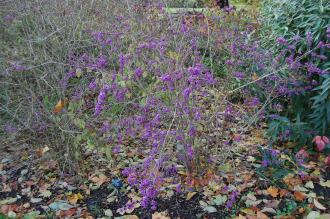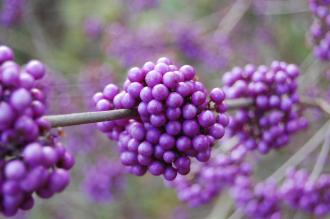
Callicarpa bodinieri var. giraldii (16/11/2013, Kew Gardens, London)
Position: Full sun to dappled shade
Flowering period: Summer
Soil: Moist, well drained
Eventual Height: 2m
Eventual Spread: 2m
Hardiness: 6a, 6b, 7a, 7b, 8a, 8b, 9a
Family: Lamiaceae
Callicarpa bodinieri var. giraldii is a deciduous shrub with a rounded bushy habit. Its dark green leaves are elliptic to obovate with sinuate margins, up to 12cm long and 6cm broad. Its leaves appear bronze in spring as they emerge in spring and turn purple/ red in autumn before they fall. Its pale purple flowers appear as panicles which are up to 35mm across. Its purple/ violet fruit are berries which are up to 5mm across and appear in autumn, they are not retained on the plant through the winter months. It should be noted, this shrub is not self fertile, more than one should be planted in order for berries to be produced.
Callicarpa bodinieri var. giraldii, commonly known as the Beauty Berry, is native to west and central China.
The etymological root of the binomial name Callicarpa is derived from the Greek kallos meaning ‘beautiful’ and karpos meaning ‘fruit’. Bodinieri is named after Emile Marie Bodinier (1942 – 1901), a French missionary. Giraldii is named after Giuseppe Giraldi (1848 – 1901) , an Italian Missionary.
The landscape architect may find Callicarpa bodinieri var. giraldii useful when planted en mass due to the stunning effect of the mass of berries in autumn. It may also be maintained as an attractive hedge.
Ecologically, Callicarpa bodinieri var. giraldii berries will be eaten by birds and mammals if there is no other food sources.

Callicarpa bodinieri var. giraldii Berries (16/11/2013, Kew Gardens, London)
The Royal Horticultural Society has given the variety Callicarpa bodinieri var. giraldii ‘Profusion’ their prestigious Award of Garden Merit in 1993.
Callicarpa bodinieri var. giraldii prefers moist, fertile, well-drained soils. It tolerates most pH of soil.
Callicarpa bodinieri var. giraldii requires little maintenance. If necessary pruning should be carried out in spring.

